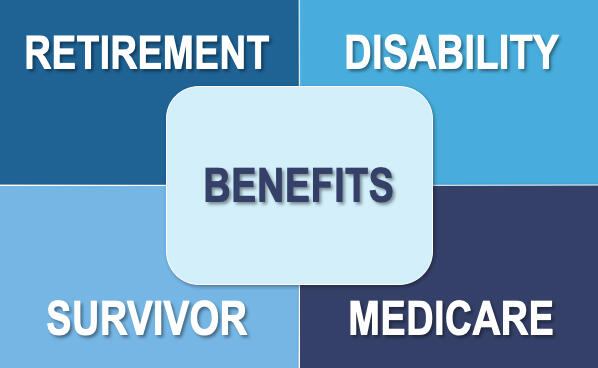Your Retirement Planning Simplified!
Be prepared for life's important moments. Your retirement doesn't have to be complex. Be there for the moments that matter. Whether you're planning for retirement, medicare, or other benefits, get the information that meet your needs
Planning your retirement has never been easier
Social Security Benefits
Qualifications to receive Social Security Benefits:
US Citizens or Alien Residents
You must have worked and earned enough Qualifying Credits (QC) i.e. 40 Quarters of coverage. (You earn 4 credits per year. This means in 10yrs, you should be able to earn 40 QCs)
You must be “fully insured.”
Qualifying Spouse or children of a qualified deceased worker.
Do You Qualify for Social Security Benefits?
What are Social Security Benefits?
Social Security is an insurance program administered by the US Government.
Social Security benefits are paid out monthly to retired workers and their spouses.
who have, during their working years, paid into the Social Security system.
Social Security benefits are also available to qualifying individuals who are completely and permanently disabled and are determined by a specific and rigid set of criteria issued by the Social Security Administration.
Social Security and all benefits that are received are funded through payroll taxes under the Federal Insurance Contributions Act (FICA) tax or the Self-Employed Contributions Act (SECA) tax. The Internal Revenue Service (IRS) collects tax deposits and formally entrusts them to one of the collective group of Social Security trust funds.
If you work you must pay Social Security taxes.
Types of Benefits
Retirement Retirement is a huge, important chunk of your life. We can help you understand and set your retirement goals, save the money you’ll need to reach them, live happier and healthier while you’re at it, and plan to leave something for your next generation.
Disability
The Social Security and Supplemental Security Income disability programs provide assistance to those with disabilities. This program pays benefits to you and, or particular family members if you are insured. This means that you worked for periods considered long enough, and that work is recent enough - and paid Social Security taxes on your earnings.
Medicare Medicare is America's healthcare insurance program for those aged 65 or older. Some younger people under the age of 65 can qualify for Medicare as well. This includes those with disabilities and those who have permanent kidney failure.
This program helps with the cost of health care, but the program does not cover all medical expenses or the cost of most long-term care.
Survior Consistent campaign messages across your social media platforms ensure that you reach your target audiences. This would put your brand at the top of their minds.
Our excellent designs feature the most eye-catching slogans and promotions, pushing towards real marketing conversions.

Retirement.
Live the life you planned.

Social Security.
Your benefits matter.

Medicare.
Your health matters.

Survivor.
Leave a legacy.
Why Plan for Social Security
More than just retirement:
Social security provides important life insurance and disability insurance protection too.
Guaranteed Progressive Services:
Social Security provides a guaranteed, progressive benefit that keeps up with inflation. That is, increases in the cost of living in the United States.
Retirement Foundation:
Social Security provides a good foundation of retirement protection for most American households. These benefits not means-tested.
The benefits of Social Security are modest:
Social Security benefits are more modest than most people realize. In June 2020, the average Social Security retirement benefit was about $1,514 a month, or about $18,170 a year.
Social Security uplifts millions of elderly Americans from poverty:
It is estimated that 4 in 10 Americans aged 65 and older would have incomes lower than the poverty line. That is, all things being equal, according to official estimates based on the 2019 Current Population Survey.
Let's see how we can help you get the information you need!
Our Newsletter.
Stay Updated Get updated on the information you need about your social security benefits.
What Does Your Retirement Look Like?

Explore Life Moments and Enjoy Them
Whether you’re thinking about your social security, medicare, disability, retirement – or any combination of these – we’ve got information on the services to help you live a brighter, more financially secure and a healthier life.

Build Lasting Memories and Savor Them
Are you on track to reach your goals for retirement? Find out what factors can affect your Social Security and other benefit payments – and see an estimate of what your benefits could be at different stages. Get the information you need.

Leave a Legacy and be Proud You Did
Looking forward to retirement? Find out if you’re saving enough, or have the right knowledge to approach your retirement with confidence. Retirement planning and Social Security benefits don't have to be complicated.

Social Security Benefits.
Social Security benefits covers several areas of a person's life. Here are 4 areas covered:
Disability
Medicare
Retirement
Survivor

Retirement.
Whether you need help deciding when to retire or are ready to start the next exciting chapter of your life, there are tools that can help you get there. At GT Consulting, we have the information you need to get started. Find out more when you book an appointment with us - and begin your journey today.

Social Security Benefits.
What is Social Security? Social Security is the term used for Old-Age, Survivors, and Disability Insurance (OASDI) program in the United States, run by the Social Security Administration (SSA), which is a federal agency.The program provides benefits to retirees and disabled people, and to their spouses, children, and survivors. The goal of the program is to partially replace income that is lost due to old age, death of a spouse, or qualifying ex-spouse, or disability.Social Security announces its annual changes to the Social Security program to take effect January 1, 2021
Social Security recipients got a 1.3% raise for 2021, compared with the 1.6% hike beneficiaries received in 2020.
Maximum earnings subject to the Social Security tax also increased—from $137,700 a year to $142,800.
Other changes for 2021 included an increase in how much money working Social Security recipients can earn before their benefits are reduced and a slight rise in disability benefits.
Social Security tax rates remain the same for 2021—6.2% on employees and 12.4% on the self-employed.
It now takes $1,470 to earn a single Social Security credit, up $60 from 2020
Note
For old-age payments, money is paid to qualifying persons starting as early as age 62. Full Retirement Aged depends on birth date and is 67 for everyone born in 1960 or later. If you decide to wait until you are aged 70 but not later, you will receive delayed retirement credits.
The full retirement age is the age at which people can receive full retirement benefits upon leaving the workforce.

Survivors
If you lose a loved one, there are survivor benefits you may be eligible to. This would help you get through difficult times. Eligible survivors such as widows, widowers, and dependents could get payment to as deemed applicable by the Social Security benefits office. Find out more about how you can get the help to protect you and your family. To qualify for these benefits:
Must be a spouse with a child under the age of 18
A child who is in high school – age 18 (19)
A widow age 60
A disabled widow aged 50

Medicare
The Medicare program helps with the cost of health care. However, it does not cover all medical expenses or the cost of most long-term care. Eligible persons have the choices for how to get Medicare coverage. You may choose to buy a Medicare Supplement Insurance (Medigap) policy from a private insurance company. Click below to learn more.

Disability
The Social Security Disability Insurance (SSDI) program pays benefits to qualifying individuals and family members if insured. That means the individual worked long enough, and that work was recent enough, who paid Social Security taxes on the individual's earnings.
The Supplemental Security Income also known as the SSI program will pay benefits to disabled persons and children whose incomes and resources have been limited.
Let's see how we can help you:
About Us

At GT Consulting our task is to provide you adequate knowledge for you to make an informed decision with regard to your benefits.We will review your record and provide you a very detail analysis that is based on Social Security Program Operations Manual System, to help you make your decision.We are also available to help you prepare for any request and your responses to any inquiry or notices from the Social Security Administration.In essence, we are detailed in our analysis and approach to ensure fruitful and favorable outcomes for you and your family.In addition we guarantee a fast, reliable, and valued service all the time.
Gallery
Let's see how we can help you get the information you need!
Contact Us.
Email: [email protected]
Phone: (813) 808 - 4187




Social Security Benefits
If you were recently denied Social Security benefits or Supplemental Security Income (SSI), you may request an appeal. Generally, you have 60 days after you receive the notice of our decision to ask for any type of appeal. There are four levels of appeal:
Reconsideration,
Hearing by an administrative law judge,
Review by the Appeals Council
Federal Court review (Please see below for information on the Federal Court Review Process).
You can request an appeal online for a reconsideration, a hearing by an administrative law judge, and a review by the Appeals Council, even if you live outside of the United States. Your letter contains guidance on what level of appeal you should select.
To learn more about each appeal level, visit Information About Social Security's Hearings and Appeals Process.
See if you qualify for Social Security benefits
Date of birth and Full Retirement Aged (FRA)
Your benefit is determined by the Worker’s Primary Insurance Amount (PIA) based on his/her date of birth.
Working While Retired
If you plan to retire and receive benefits, there are notables:
Income/Earnings limitations
Tax implications
If you plan to retire and receive benefits, there are notables:
Income/Earnings limitations
Tax implications
For instance:
Retirees (or survivors) who choose to receive Social Security benefits before they reach full retirement age (FRA) and continue to work have an earnings limit.
In 2017 for example, the annual earnings limit was $16,920 for those under FRA the entire calendar year. In 2018, it is $17,040. If you earn over the limit, we deduct $1 from your Social Security monthly benefit payment for every $2 you earn above the annual limit.
In the calendar year you reach FRA, which you can check out on our website, you have a higher earnings limit. Additionally, the Social Security Administration will only count earnings for the months prior to FRA. In 2017, the limit was $44,880. In 2018, it is $45,360. In the year of FRA attainment, Social Security deducts $1 in benefits for every $3 you earn above the limit.
**Please see your financial Advisor/Accountant: With regard to taxes and investments issues. **
Feel free to contact us today and learn more on how we can help you: